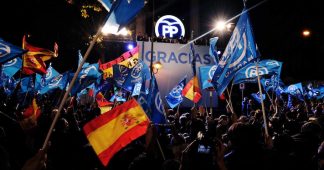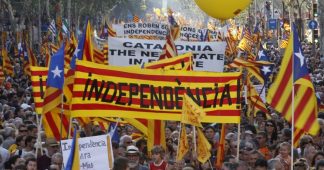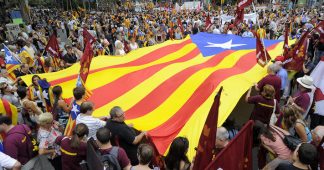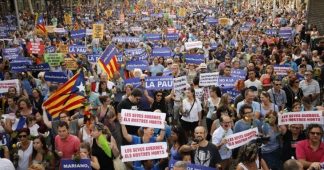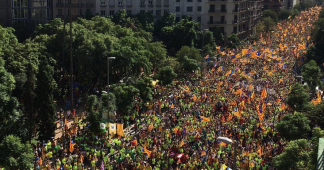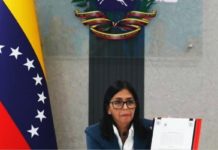Spain threatens potential military takeover of Catalonia as referendum looms
By Alejandro López
Spain’s conservative Popular Party (PP) government is continuing its clampdown on the referendum on Catalan independence scheduled for October 1. Prime Minister Mariano Rajoy is threatening to implement an emergency clause of the Spanish Constitution to block the vote.
On Friday, Rajoy travelled to Barcelona and said Catalonians “are making a mistake, and you are going to force us to go where we don’t want to go.” Last week, PP parliamentary group spokesperson Rafael Hernando and Justice Minister Rafael Catalá separately called for its invocation.
Read more at http://www.wsws.org/en/articles/2017/09/18/spai-s18.html
Catalan referendum: resisting the Spanish government siege
In 1713-14, it took the troops of Spain’s Borbon monarchy 14 months to take Barcelona and end Catalan self-rule. Three centuries later, Catalonia is again under siege, this time from the central Spanish People’s Party (PP) government.
Under Prime Minister Mariano Rajoy, the Spanish state is concentrating all its firepower on stopping the Catalan government’s October 1 independence referendum, where Catalan citizens will be asked to vote on whether “Catalonia should become an independent state in the form of a republic”.
Read more at https://www.greenleft.org.au/content/catalan-referendum-resisting-spanish-government-siege
Podemos, Catalonia and the workers’ movement in the Spanish state
Héctor Sierra
Three years ago, the Spanish prime minister Mariano Rajoy looked like the captain of a sinking ship. Following the outbreak of the 2007-8 economic crisis and as an austerity package, imposed by the Spanish state with the support of European Union institutions, tightened its grip on workers and students, the largest mobilisations in decades took place. The occupation of public squares, known as the 15-M or indignados movement, four general strikes and the emergence of rank and file movements opposing evictions and cuts gave rise to a vibrant political atmosphere. In the space of a few years, the king appointed by former dictator Francisco Franco was forced to abdicate in favour of his son. The combined vote share of the two parties that had dominated Spanish politics for three decades—the conservative People’s Party (PP) and the social democrat Socialist Party (PSOE)—plummeted from an average 80 percent to below 50 percent. Meanwhile, Podemos, a new political force on the left, was leading the polls. The pillars of post-dictatorship Spain seemed to be crumbling.
Read more at http://isj.org.uk/podemos-catalonia-and-the-workers-movement/
The Loneliness of the Long-Distance Runner
Josep Maria Antentas
The new Catalan party, Catalunya en Comú, faces challenges all new political organizations must overcome.
On April 8, Catalunya en Comú, a new Catalan party, officially launched under the sponsorship of Barcelona mayor Ada Colau. The new project aims to turn the successful electoral alliance between Barcelona en Comú (Colau’s own party), Podem (the Catalan branch of Podemos), Initiative for Catalonia Greens (ICV, a Green party with Eurocommunist origins), and United and Alternative Left (EUiA, the Catalan branch of Izquierda Unida, the Communist Party of Spain’s electoral front) into a single party. Already, the alliance won the Spanish general elections in Catalonia on December 20, 2015 and on June 26, 2016, producing high expectations for this new formation.
Read more at https://www.jacobinmag.com/2017/06/the-loneliness-of-the-long-distance-runner
